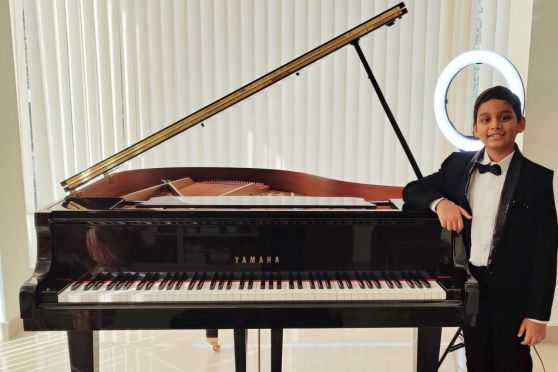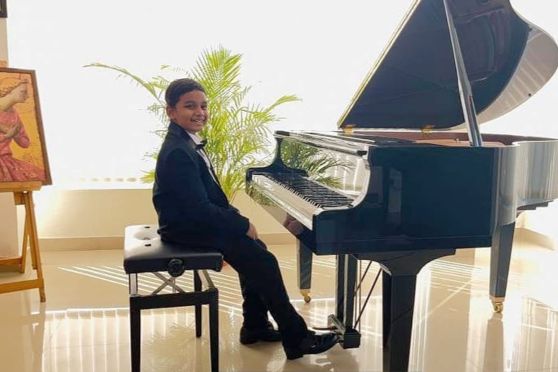Meet 9-year old Aarav Lad: Winner at the Music of the World Competition


The sooner parents encourage their child to learn basic skills in different areas, the faster they transition to more advanced skills. Our young champion in today’s story is one such exceptional talent: Aarav Lad of standard 4 from Ekya Schools BTM. Arav has secured 2nd place in piano solo in an international music competition - Music of the World, that has participants from many different countries around the world.
The jury members of Music of the World consists of eminent and accomplished musicians and the participants are judged on the degree of mastery of the instrument, the purity of intonation, the musical structure and the complexity of the repertoire.
Aarav (age 9) is an avid pianist who started learning to play the piano at the age of 5. He has been learning with concert pianists Natallia Kapylova and Liudmila Drazhnik for the past year. Aarav finds immense pleasure in learning new and challenging classical pieces and aims to build his repertoire through his commitment and love for classical music. His favourite composers include Franz Liszt, Frédéric Chopin and Mozart.
The Telegraph Online Edugraph recently connected with the young pianist, who said, “I love learning new things. I had a small 32-key piano when I was 4, my mom would bring me notes of rhymes and songs, which I liked playing. I started learning on a real piano at 5 years - Mom and I joined the class together. She stopped learning after a couple of months, but I continued! Now I try to teach her sometimes”.
As best-selling author Malcolm Gladwell put it in his famous 10,000-hour rule, mastering complex skills and materials, like playing the violin or being as good as Bill Gates at computer programming, requires long hours of hard work. And Aarav's win is a testament to the fact that he has put in the time, effort and dedication needed for one so young to display mastery in the art.

“Perseverance and perfection are the qualities I’ve learned from my music teachers. They are able to identify even the slightest variations in my music and help me perfect it. They've helped me become more expressive on the piano, they help me understand the complexity of the piece and what the piece should convey to the listener” added Aarav.
All children are born with higher abilities in some areas than others. Observing a child allows one to understand what skills they have. Often, what we see as one skill, such as spatial awareness for instance, can translate to excellent talent in a completely different area. Keeping an eye on a child's natural behaviours, and encouraging them to express themselves and develop their natural talents is a good place to start.
“Other than piano, I enjoy speed cubing, maths, reading, and playing badminton. I love solving different kinds of Rubik’s cubes and participating in cubing competitions. I also love Math and do a lot of it every day; I recently built a project to test the Collatz Conjecture. I like to read fiction and science books. I'm currently reading Bill Bryson’s “A Really Short History of Nearly Everything”, Aarav concluded.
It is believed that musical experience is a crucial element to help young children build pathways in the brain, also called neural connections. Not only is music a performance-oriented and engaging means to address skill areas, but it also promotes neuroplasticity by linking non-musical skills to music. It enables the brain to engage synchronously, facilitating communication between both hemispheres. In other words, musical talent can help your children succeed across a variety of areas in their life!
The Telegraph Online Edugraph congratulates Aarav and wishes him all the very best for his future endeavours.